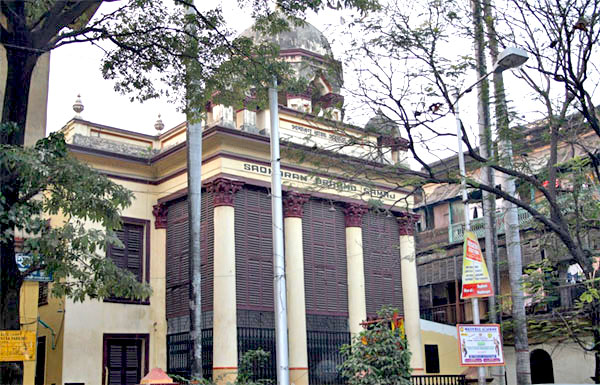Brahmo Samaj
The Brahmo Samaj is a Hindu reform organization, founded in 1828 by Ram Mohan Roy in Kolkata.
Although the Brahmo Samaj never had many members, its influence on the intellectual life of Bengal was considerable. One of his concerns, the prohibition of widow burning, 1829 issued by the then Governor-General Lord Bentinck as law.
Even Ram Mohan Roy had to defend himself against his opponents, who accused him, he misunderstands the Vedic tradition. Only when Debendranath Tagore (1817-1905), a highly respected Brahmin and thinkers (the father of Rabindranath Tagore ), which took over management, the community came to greater flowering and won many members of the educated upper class Bengali. Although Tagore was of the view that Christianity could India offer nothing, played the confrontation with Christianity for the Brahmo Samaj a major role. Tagore's belief developed in deistic direction. Therefore, he rejected all the teachings of the Vedas, which were not compatible with the pure deism.
Tagore gave the community an organization and a profession of faith (1843 ). This said that God does not incarnate; He hears and answers the prayers of human and must be worshiped only in spirit. The Brahmo Samaj was against the worship of images, asceticism and polytheism. All box to reach God through worship. God reveals himself directly in nature, no Scripture is binding. This creed was recorded together with extracts from the Upanishads and other Hindu scriptures in a manual ( Brahmo Dharma ).
The Brahmo Samaj principles are:
- There is only one God who is the Creator and the Redeemer of the world. He is a Spirit, infinite in power, wisdom, love, justice and holiness - omnipresent, eternal and blissful.
- The human soul is immortal and capable of unlimited progress. She is responsible before God for their actions.
- The happiness of man in this world and the next is to worship God in spirit and in truth.
- To love God, to hold communion with him, and do his will in all aspects of life, makes true worship.
- No created object is to be worshiped as God, and God is to be regarded as infallible alone.
Keshab Chandra Sen (1838-1884), who became the bhaktigläubigen mystics from the rationalistic theists, targeted not only by a Hindu reform, but after a comprehensive universal religion throughout India. 1865 broke with the more conservative members of the community who were more oriented philosophy of religion. These formed henceforth the Adi Brahmo - Samaj. As Sen 1878 wanted to marry off his minor daughter, contrary to its own statutes, there was a new schism in the Brahmo Samaj Sadharan and the Brahmo Samaj Naba Bidhan. After his death in 1884 lost the latter branch, which was inclined to meet by enthuastische devotion and religious festivities the needs of other groups, very important.
The Brahmo Samaj played a significant role due to the social status of its members. Even Vivekananda had temporarily Brahmo Samaj the Sadharan heard before he remembered picking up on Hindu traditions and the Ramakrishna Mission founded in 1897.
Sivnath Shastri points out in his book on the history of the Brahmo Samaj out that there was a greater appreciation of Western ideas given within this union as Hindu ideas. From this, the general attitude of the Hindu public had resulted, the Brahmo Samaj if it were actually to Christianity, but in a different guise. The high point was the movement reaches 1912, when 232 towns across India were active. The death of Rabindranath Tagore who supported the Adi Brahmo Samaj of piety towards his father Debendranath was, at the same time the end of the era Brahmo Samaj, Brahmo Samaj particularly the Adi. The Brahmo Samaj Sadharan other hand, is still active today and advertises through worship and social missionary activity ( orphanages, widow asylums, etc.) for his ideas.









